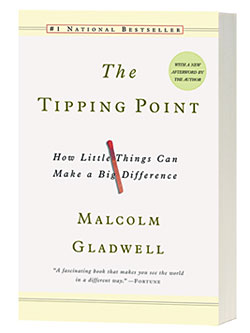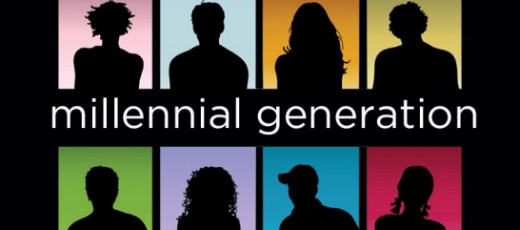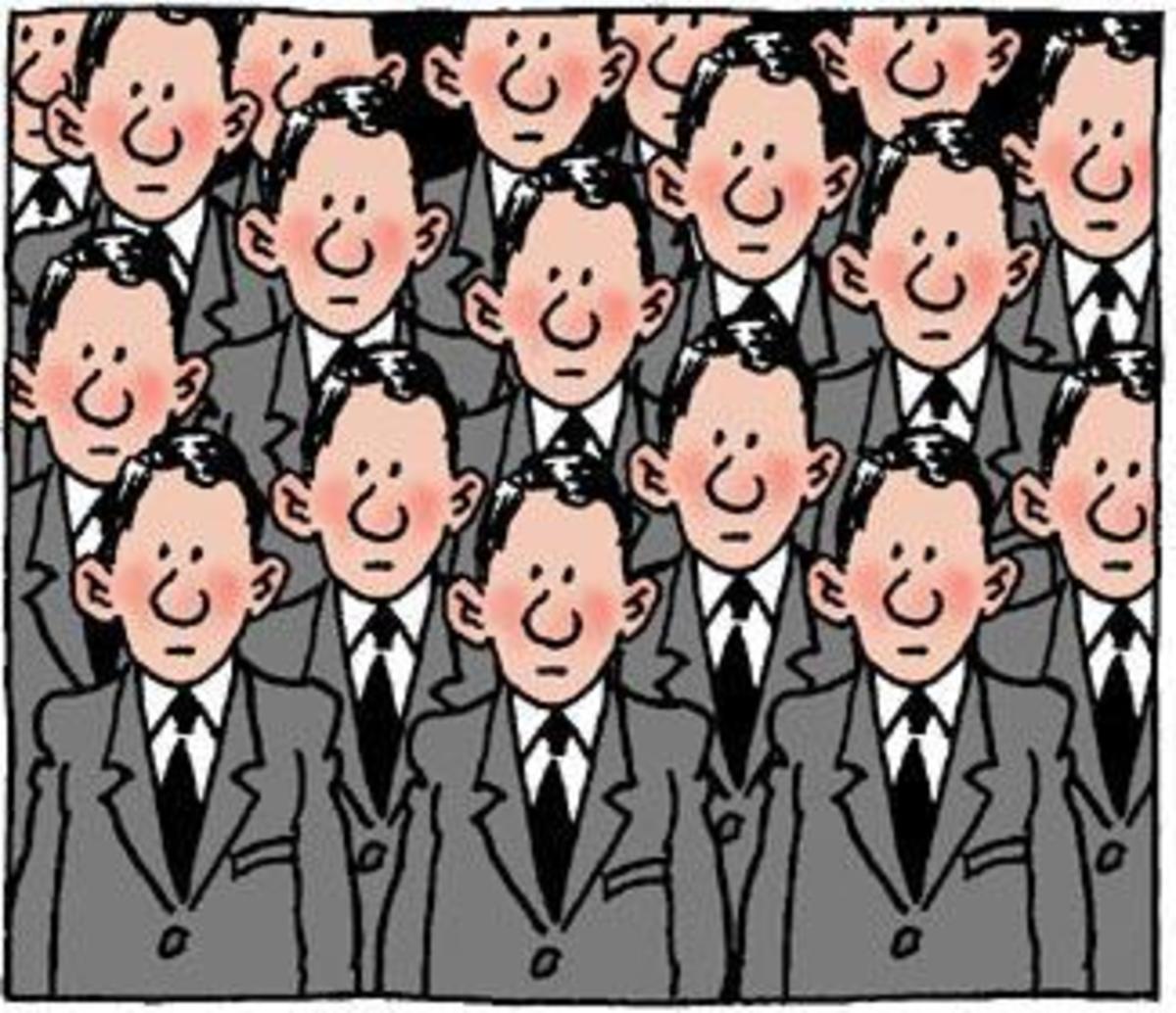Hypocritical Nonconformity

In Malcolm Gladwell’s essay “The Tipping Point” he explains how and why epidemics of all sorts are pushed beyond their tipping point, a moment in a series of events that typically lead to a significant, often irreversible reaction occurs, Gladwell states “when an epidemic tips…it tips because something has happened” (Gladwell 3). He further explains the three agents that can cause such a change to an epidemic equilibrium: “the Law of the Few, the Stickiness Factor and the Power of Context” (Gladwell 3). The Law of Few is like the 80/20 law, which states that typically eighty percent of work is done by twenty percent of people. For example, someone like Darnell “Boss Man” McGee can be responsible for infecting thirty people with HIV alone. The Stickiness factor states that there are certain ways to make messages or phrases “contagious” and “memorable” (Gladwell 6). Finally, the Power of Context is to explain situations in terms that make others sensitive to something they would not typically be sensitive to. A change in any combination of these three factors can cause an epidemic to tip, social or disease related.

Likewise, in her study “Calculated Risks” K.C. Cole considers how people are externally influenced, when it comes to risk assessment. She explains those external influences in three separate techniques: numerical statistics, psychological studies and personal experiences. Additionally, she addresses how these external influences have led to the poor risk-taking processes people use. Everyday occurrences have a higher risk as something most people fear. Most of the confusion around risk taking is people’s misunderstanding of statistics. For example, there’s a better chance of dying because someone is unmarried than from cancer. However, not all risks are bad, risks aid in progress and in the end, as morbid as it may seem, we’re all destined to die. Nowadays, people are overly concerned about one time happenings such as plane crashes, instead of the hundreds of deaths daily of starving children. Such thought patterns have distorted the human race’s ability to go about risk taking logically. People attempt to base all of their reasoning on numbers; however numbers are not the only thing we should rely on. Because of this out lives are controlled by caring about exotic, dramatic, singular situations to base their risk taking assessments instead of common sense, which is not very common anymore.
Though not explicitly addressed, an abstract concept that Gladwell and Cole seem to explore is of what control we do and do not have. This idea can be seen when Gladwell emphasizes the Law of the Few and how a minute percentage of people control us indefinitely, whereas Cole states that ultimately control is decision based but is heavily influenced by external sources, but we all have the capacity to control our own lives. If what Gladwell suggests is true and we are largely controlled by a select group of the population and those few decide how the remaining population exists, why do people promote individuality, but conform to social norms? And if what Cole suggests is true why do people conform to social norms if we have the capacity to control our own lives?

Why do people promote individuality? By individuality I mean a single person striving for a state of being separate from others. In her online article “Generation Y - The Millennial Generation” Julie Coates enlightens her readers on the complex mysteries of “Generation Y.” Referring to individuality Coates explains that “Generation Y, born between 1976-1995…is the most diverse generation in history” and we got there because we rebelled from the elder generations and thus became the most tattooed and pierced generations yet. This example relates to the idea of the promotion of individuality because it is a specific and relevant instance in modern history. In Anne Fisher’s essay “When Gen X Runs the Show” describes the work ethic of Generation Y. She explains that we are not a lazy generation, but rather one where we all aspire for the perfect position in life and have no desire to settle for anything less. “For one thing,” Fisher elucidates, “Generation Y — the tattooed, techno-raised bunch born from 1979 to 2000 — is unlikely to follow in their parents' footsteps. They think putting in long years of effort at any one company in exchange for a series of raises and promotions is pointless.” In other words, generally Gen Y is a team of go-getters that are more concerned with personal happiness than affluence. Gen Y is a generation of rebels that refuse authoritative figures as superior and feel as if we are destined for our own greatness, despite what everyone says. Individuality is promoted because it is considered bad to conform to what others do and identity is valued in modern society. Though completely individuality is promoted outwardly, internally nonconformity has restrictions. These restrictions are different from person to person and no matter what anyone says, they all hold people to certain standards. Obviously because nonconformity is defined as free from others opinions or influences; “restricted nonconformity” is just conformity.
But, why do people promote individuality and conform to social norms? By conform I mean a greater part of the population complying with the fixed standards of a small percentage of the population. An example of conformity is those in the younger generations following others to create the most tattooed and pierced generation to gain acceptance from their peers. In Jennie Le’s article “Tattoo vs. Taboo: A Question about Body Art” she explores how and why body modification went from being “equated to ‘gangster’ and ‘not lady-like’ to socially acceptable. She goes on to the realization “the media is littered with tatted and pierced celebrities” and that “non-conformists make up most of the community.” It’s a bit of a paradox, conforming to nonconformity, but that’s unfortunately and typically how society works. However, we all choose which nonconformities to conform to. If people were to take that concept of control over identity further, everyone would develop his/her own personality and identity and we would truly have a nonconformist society.
So what makes people conform to social norms, if we have the capacity to control our own lives? By control I mean, having authority over one’s own decisions. The idea of control is illustrated by Malcolm Gladwell in one of the three agents he developed: the Power of Context. Gladwell explains “The Power of Context says that human beings are a lot more sensitive to their environment than they may seem.” (8). In other words, the Power of Context rationalizes why humans choose which nonconformities to conform to. These decisions may seem like they are made consciously but most of them are very subconscious. Each person decides which “look” is best for him/her, and that decides which clique will accept him/her. Obviously there are some things no one can control: skin color or height. However, we still try to change those things. It seems like girls are more concerned with their physical appearance: pale girls wear bronzer; short girls wear high heels. Guys are more concerned with their fiscal appearance: guys will care more about what kind of car they drive and will take care of its luxuries over its necessities. Clearly these are generalizations, but that’s just it, generally these standards apply. I am a pale individual and I am perfectly happy with that, however my sister is obsessed with being tan. She will stop at nothing to get me to wear bronzer, even though I end up looking orange, or go tanning with her, even though I do not tan, I burn.
So, why do people promote individuality, but conform to social norms if we have the capacity to control our own lives? Well, there is no simple answer to this. Why do people promote individuality? Some do not. Why do people conform to social norms? Some do not. There are and always will be exceptions to every generalization put on the human race, it’s a fact. However, it seems that non-conformity is the new trend in personality types for Generation Y and generations to come. While there will always be sheltered people in this world, nonconformists and “hipsters” are growing, while conservatives dwindle in numbers. Personally, I would love to see planet earth become a non-conformist society where everyone is free to express themselves as they please, but let’s get real, that will not happen for centuries at the least.






